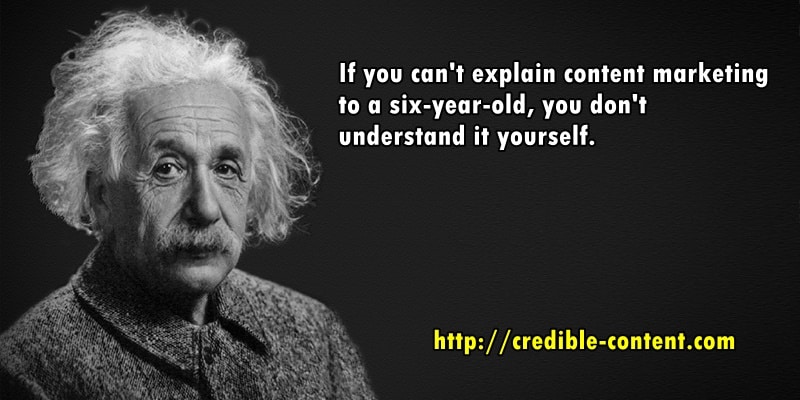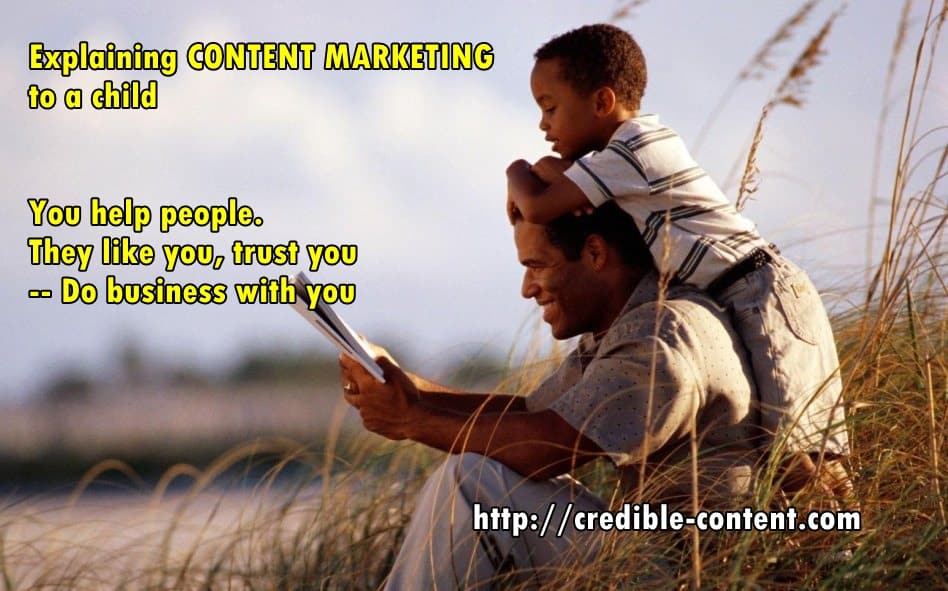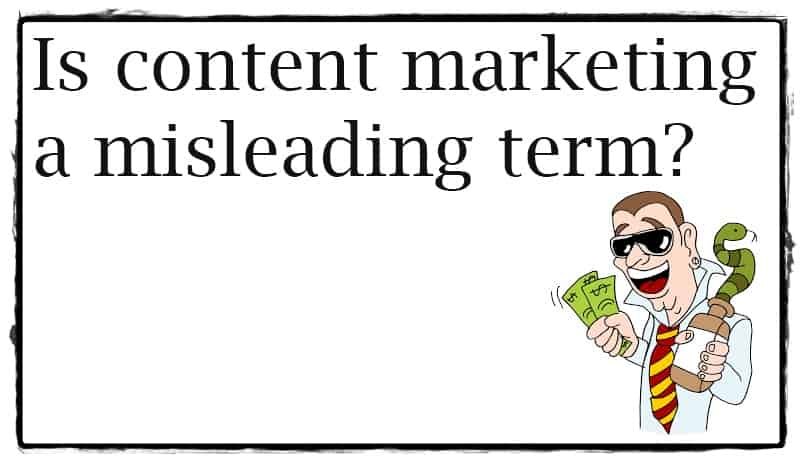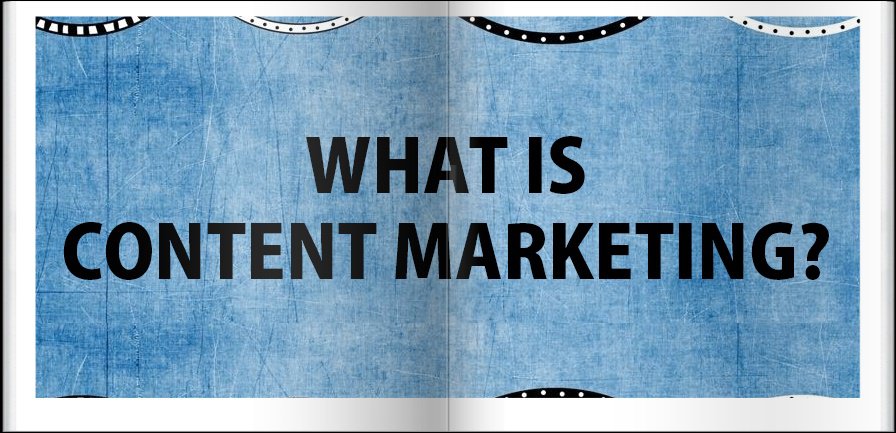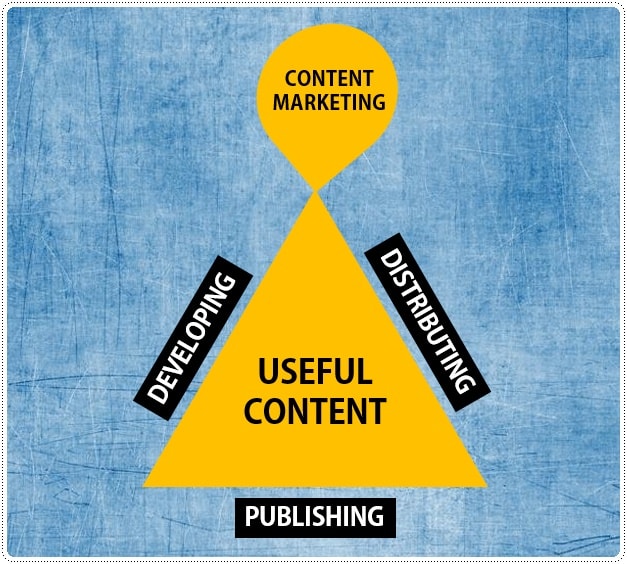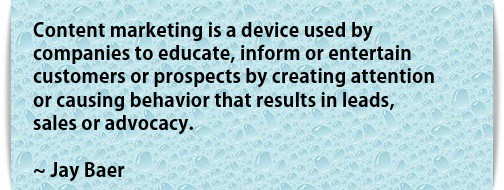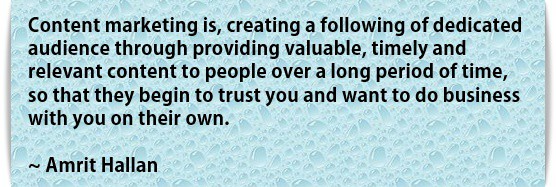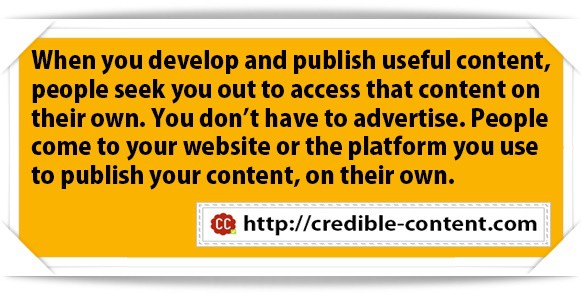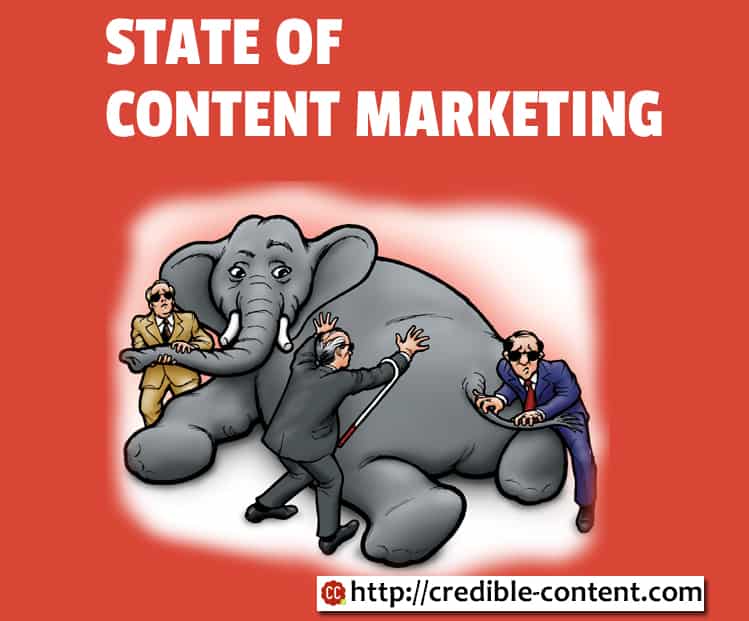The good thing is that more and more businesses are understanding and recognising the power of content marketing. The bad news is, most of them don’t really understand what content marketing is and they are constantly running behind quick fixes. The presumed facts about content marketing, if not totally wrong, are not what they should be, and consequently, when business owners and entrepreneurs don’t see any positive results, they get disenchanted and worse, also start discouraging others from pursuing content marketing.
The thing is, if you are barking up the wrong tree is it the fault of the tree or your judgement? Obviously your judgement.
Listed below are 10 facts about content marketing people are constantly getting wrong.
1. Content marketing means improving your SEO
Most of the businesses want to publish lots of content because they want to improve their SEO. Trying to improve your SEO is not a bad thing but if you are using content marketing for this purpose, it’s an overkill. Content marketing is a complete mechanism, a complete process, of getting people to your website and then turning them into your customers and clients. By simply focusing on your SEO you may improve your search engine rankings and hence also increase organic traffic, but if you don’t focus on your branding, if you don’t get recognised for your quality of content and if you don’t target your audience, all your traffic will go waste.
2. Content marketing shouldn’t cost much
By this I don’t mean it should cost more but many business owners presume that since it is just writing, it shouldn’t cost the way other services (web designing, accounting, programming, etc.) cost. Like any other service, writing, producing, publishing and disseminating content is a real activity and people require expertise to carry it out. It takes years of training to consistently create quality content that remains true to your brand identity. Besides, content marketing isn’t always about writing and publishing content, a major part involves promoting your content and responding to user behaviour.
Just in the morning I come across a website selling “well-written” articles for $ 1.25 per article. At the surface it might seem quite enticing. Just imagine the amount of content you can get for $ 1.25 per article. But have you ever considered why such writers are never hired by businesses that actually make money? Even eHow, a company known to have made millions of dollars through AdSense-supported content, was paying or is paying $ 15 per article. And that’s not even “well-written” content as you may come across on many professional websites.
The point is, when you are looking for a serious, committed and professional content marketing service, extremely low cost (for example, $ 1.25 per article) shouldn’t be the only criteria. Dependability, expertise, writing quality and marketing experience should come as a complete package.
3. Content marketing is for big businesses
People are more comfortable with conventional advertising and they are also familiar with the way it works. You advertise and people respond to your advertisements. When it comes to content marketing many small businesses think it’s a fuzzy concept that requires lots of money and involvement. You daily come across questions like “what exactly is content marketing?” But how often do you come across something like “what exactly is advertising?”
Due to lack of awareness many people think that content marketing is for big businesses that can invest lots of money and hire multiple employees to create high-quality content around their brands, publish that content, broadcast it and then generates lots of buzz as well as inbound traffic.
I’m going to contradict myself yes, $ 1.25 per article can work for many businesses looking for lots of product and service descriptions and if these product and service descriptions are well-written and if you can post these product and service descriptions on your social networking websites or even broadcast them to your newsletter subscribers, this is an example of good content marketing.
Just as you can have an ad during the Super Bowl, you can publish pamphlets on your printer and distribute them in your locality; these are both examples of advertising.
Similarly, whether you storm the Internet with a celebrity endorsement or 5 hundred articles and press releases in a week or you consistently publish a single blog post every day and then promote it on Facebook and Twitter these are all different levels and forms of content marketing and hence, whether you want to pursue content marketing or not doesn’t depend on your business size, but on your strategy and your understanding of content marketing.
4. Provided your content is well-written, there is no need to target search engines
Although your rankings primarily depend on the level of competition you face, the quality of your content, the way you have used the language and the phrases, directly impact your SEO. Google’s SEO guidelines clearly state that write content in such a manner that it is good to read, easy to access and stick to the point and if you stick to these guidelines, you automatically improve your search engine rankings. But many content marketers believe that you should totally disregard search engines.
Whether you want to target search engines or not is your own prerogative, but you can get lots of targeted traffic from search engines because millions of people use them to find relevant information. But creating high-quality content for your target audience doesn’t mean you should ignore SEO. You can follow SEO practices while creating high-quality content. I do that on my website and blog and I also do that for my clients I can maintain the balance even while creating keyword-century content.
The problem is not with overly focusing on SEO or totally ignoring it, the problem is with getting carried away. The problem is either focusing on your audience completely or focusing on your SEO, completely. Maintain a balance. Write content for humans but use keywords and key phrases that these humans use on search engines in order to find the information you have published.
5. You cannot predict the success of your content marketing campaign or strategy
Well, using the same logic you cannot even predict the success of conventional advertising. Nobody has been able to create the perfect formula for ensuring the success of conventional advertising. Nonetheless, since it’s being done since time immemorial, people are more trusting towards conventional advertising and a bit cynical towards content marketing.
So, can you predict the success of your content marketing campaign or strategy? This Oracle report (it is a PDF) precisely calculates the ROI of content marketing and how you can definitely make out how much improvement you’re going to experience with your content marketing strategy provided you do all the right things. For example, in the very beginning of the report they write that “per dollar, content marketing produces three times more leads”.
Saying that you cannot predict the success of your content marketing campaign or strategy is akin to saying you cannot predict whether you are going to get more business or not by installing a telephone or by opening a new branch in another locality.
Content marketing is a platform. It’s a communication channel. It’s an engagement mechanism. What sort of business you get is a byproduct of the platform, the communication channel and the engagement mechanism you can establish.
6. Content marketing only means creating lots of fun content for the B2C market
When people approach content marketing from this angle they immediately feel discouraged when they realise that they are either serving the B2B market or their product or service is not “interesting” enough to warrant content marketing success.
Yes, fun stuff does well but only in terms of creating buzz and to an extent also brand awareness but even if there is no fun factor (and who says there cannot be fun factor in serious business?) content marketing can be one of the greatest tools to put your point across and make a presence for yourself.
If you think content marketing is only for a B2C audience, you will be surprised to know how Intel is using content marketing to strengthen its presence. You very well know that Intel is as B2B as it gets. It cannot directly sell its microchips and other hardware products to consumers. But it can certainly encourage consumers to purchase electronics and gadgets that use Intel products. Remember “Intel Inside”? It was a very clever marketing tactic. In fact to promote its content Intel is publishing a complete magazine called iQ.
Although as a small business or even as a medium-sized business there is no use trying to emulate Intel, but the point is, content marketing can be used for every business. The problem is not with content marketing, the problem is that sometimes people don’t understand how to use it and turn it into a formidable inbound marketing tool.
7. Content marketing should deliver fast results like conventional advertising
Frankly, it can, and it cannot. It depends on your market, your content marketing approach and the reaction of your audience. Having said that, remember that content marketing is not a machine or a formula. It’s a platform. It’s a channel. Take the example of a television channel. For a few months every channel has to work without getting advertisements. Then, as its audience builds up it begins to get ad revenue. The same happens with your content marketing. First you need to make a presence. People need to relate you to your content quality. This takes time unless you have got lots of money, like Intel. Even creating and writing quality content takes time.
The problem on the Internet is there is lots of noise and “voice” is rarely heard and when it is heard, since there is already so much noise vying for your attention, you either end up ignoring the voice or soon forget about it. In order to remember the voice, you need to be exposed to it repeatedly, on an ongoing basis. This “voice” is quality content. You need to constantly publish and distribute quality content in order to maintain your place in people’s memory. Again, this takes time but once you have embedded your voice inside people’s minds, you have got them as your customers and clients for life.
8. Promoting content is secondary to publishing content
Going back to the Intel example, its Global Paid Media & Content Strategist Luke Kintigh rightly says that
We have the mantra that for every dollar and hour spent on content production, it has to be matched with a subsequent dollar and hour devoted to amplification. Being agile and quickly acting on early distribution insights is also critical to optimizing recently published content as well as iterating and creating more content that will stick with your audience based on what youre seeing resonate.
A big part of content marketing is, what the phrase so eloquently says, “marketing”. You have got content, and you have got to market it. Marketing your content means making sure that your content reaches the right audience. No matter how great your content is, unless people know about it, unless the content is at a place where it can be found without much fuss, unless people can be brought to your content, unless there is a mechanism that attracts your target audience to your content, you aren’t going to achieve much success in content marketing.
9. Once you have gotten a certain number of blog posts and webpages, your content marketing is done
Content marketing isn’t publishing twenty blog posts or publishing ten webpages or submitting twenty-five articles to article submission directories. Yes, they help you, but in order to show some tangible results, content marketing needs to be an ongoing process. In fact, let us call it a process rather than a “campaign”. Let us call content marketing a part of the business. For example, you need to make phone calls regularly to your prospects. Do you call this exercise “making calls campaign”? No, you do it every day as a business development exercise. The same is the case with content marketing. Quality content writing, production and distribution is an ongoing process.
You may think, “Heck, does it mean ongoing expense?” but this is not the case. Don’t take it as an extra cost, take it as an operational cost, just as you need to pay the office rent, the electricity bill, the telephone bill, the Internet access, remuneration to your employees, etc.
Content marketing is one of the best things to have happened to small business owners because it empowers you to compete with the big guys by being innovative, persistent and quality conscious. The trick is, yes, being persistent for a long time and publishing and distributing content your target audience is looking for.
10 Quantity try and is over quality
Precisely this is the reason why many entrepreneurs and business owners find the idea of hiding content writers charging $ 1.25 per article enticing. You can get tons of content at an extremely cheap rate. Well, the problem is, you also get cheap content, most of it plagiarised and full of grammar and spelling mistakes. Of course there are exceptions. Exceptions are everywhere. And if you want to base your content marketing on exceptions, well, go ahead.
But if you really take your business seriously, don’t compromise on quality.
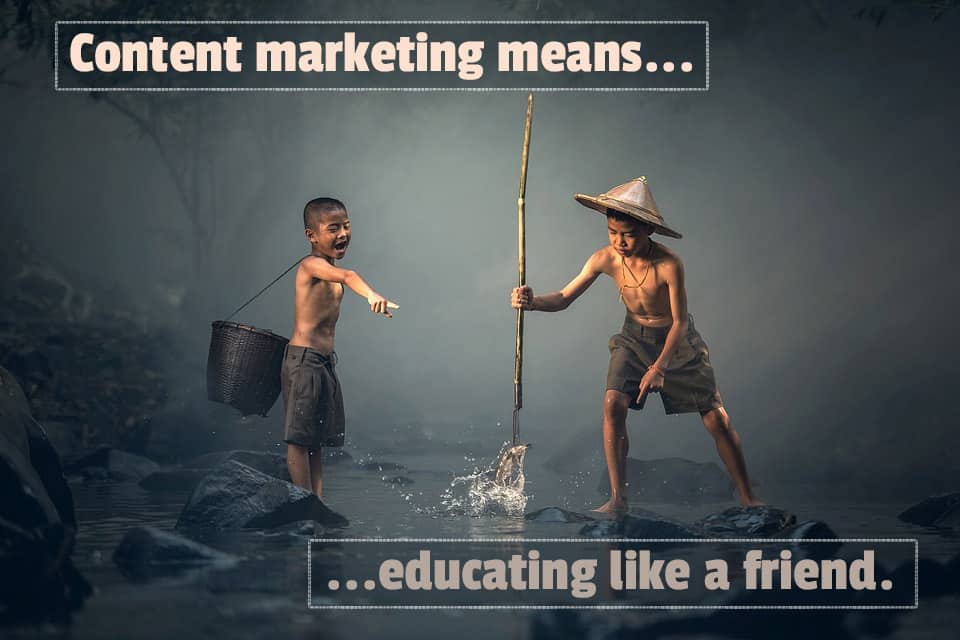 No, I’m not asking this question. Avinash Kaushik has raised this question in his recent newsletter. Actually, he has taken an example from a Think with Google web page and has dissected various sections of the page to illustrate that the writer has merely thrown around his verbosity without communicating anything concrete. Here is the web link to Avinash’s latest newsletter update.
No, I’m not asking this question. Avinash Kaushik has raised this question in his recent newsletter. Actually, he has taken an example from a Think with Google web page and has dissected various sections of the page to illustrate that the writer has merely thrown around his verbosity without communicating anything concrete. Here is the web link to Avinash’s latest newsletter update.
